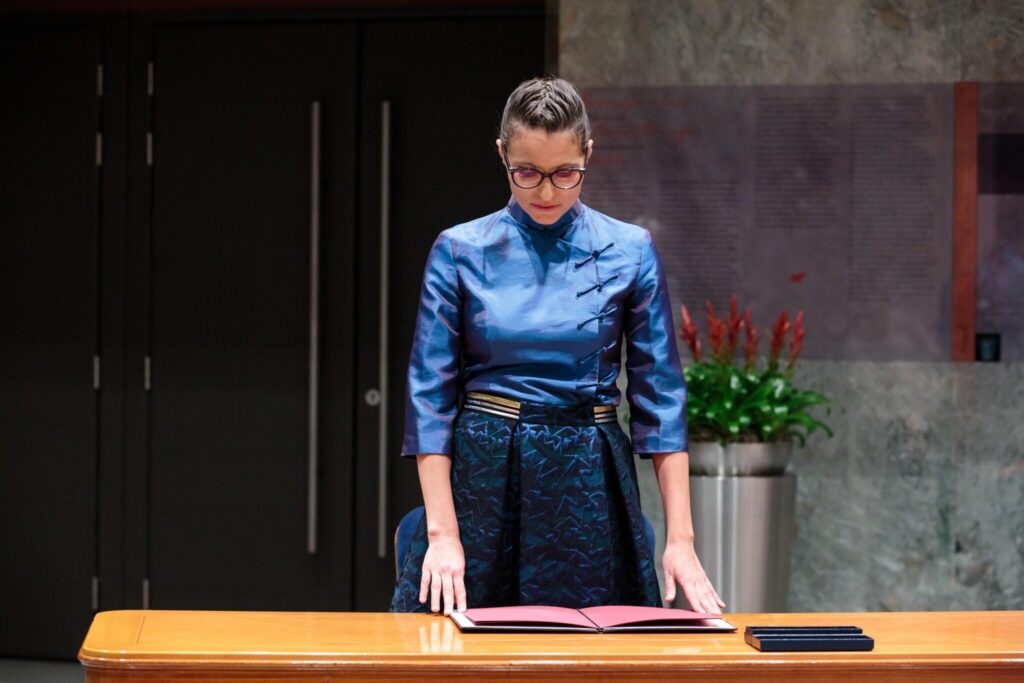The damages claim of the President of the Slovenian Democratic Party (Slovenska demokratska stranka – SDS), Janez Janša, involved key people in the Patria case, who conducted the trial on the basis of an unspecified place, time and means of communication used for committing the crime, and their legal judgement was subsequently overturned by the Constitutional Court. Janša, who was unjustly imprisoned, sought compensation from those responsible – but the judge in Kranj rejected his claim without a single piece of evidence. After the judge’s partial written decision has become final, the lawsuit against the state is to be continued.
“To have a trial is one thing, but a political showdown is quite another. And this was a political showdown. To quote the former Constitutional Court judge Krivic, it is clear at first glance that what we were tried for in the Patria case is not a crime. Those who participated in this knew that they were not conducting a trial, but a political execution, and that there would be no accountability or that they would not have to pay damages,” Janez Janša told the media – at the beginning of January, we announced that the Kranj District Court would finally hear a compensation lawsuit in which the President of the Slovenian Democratic Party (SDS) and former Prime Minister is demanding 900 thousand euros in damages from the former prosecutor and judges who tried the Patria case.
The judge announced at the beginning of January that the court would first decide on the possible liability of the prosecutor and the judges, and that the decision would be issued in writing. Janša recently tweeted the partial judgment – the District Court judge Tanja Bizjak has ruled that the claim of the plaintiff should be dismissed, in the part that reads: “The defendants Branka Zobec Hrastar, Barbara Klanjšek, Milan Štrukelj, Vesna Žalik and Branko Masleša are jointly and severally liable to pay the plaintiff the amount of 901,119.96 euros, with statutory interest from the 29th of September 2017, within a period of fifteen days.”
“Without a single piece of evidence, the judge in Kranj dismissed the damages claim against Masleša and the other players in the Patria case, saying that the innocent taxpayers should pay for the damage instead of them,” Janša commented on the judge’s decision. Janša had accused those involved of illegal work in the Patria trial, which eventually became time-barred. As he said when he appeared in court at the beginning of January, these specific individuals changed the course of political history in Slovenia by abusing the instruments of the rule of law. He stressed that the Patria case was not about a trial, but about a political reckoning and a political execution. Janša’s lawyer, Franci Matoz, argued that the proceedings had provided sufficient evidence to prove that the individuals being sued had acted arbitrarily with the intent to cause harm, thus fulfilling all the elements of liability for damages.
It was an abuse of the law, as the judge abused his position to cause damage to the claimant
The judge seems to have decided that the claim had no basis in the alleged facts. However, she failed to appreciate that this was not a case of miscarriage of justice – indeed, the immunity of judges from damages might apply in that case. In the present case, however, there was an abuse of the law in that the judge had abused his position with the intention of causing damage to the claimant. It is, therefore, not a case of damage in the exercise of or in connection with the judicial profession, but of damage deliberately caused, where the exercise of the judicial profession was not the aim, but the judicial office was merely a means of causing damage – the judicial office was therefore abused. When the abuse of a position, in this case, the judicial office, is committed with the aim of causing harm to another (which is also a criminal offence), we can hardly speak of immunity from damages for judges. This immunity applies only to cases of judicial service, i.e., cases in which the purpose of the judge’s conduct is the administration of justice and not the abuse of judicial office. In the present case, however, once again, the performance of judicial duties was not the aim but only a means of causing harm. And if that is a criminal offence – which it certainly is – then it cannot be said that the injured party has no claim for damages against the intentional inflictor of the harm.
At the hearing on the 8th of January, the judge refused to allow the evidence to be presented, after hearing some witnesses, including former Constitutional Court judges Miroslav Mozetič and Mitja Deisinger. However, Matoz stressed that the failure to take the proposed evidence constituted an absolute violation of the appropriate process. The judge also rejected the applicant’s request for a stay of proceedings in order to initiate proceedings before the Constitutional Court on the unconstitutional lacuna in the law regarding the direct liability of judges and prosecutors. The judge believed that there was no unconstitutional lacuna in the law. After the final judgment in her partial written decision, the action against the state should be continued. As explained by Miha Kunič, the state may have to pay compensation because the defendant was wrongfully imprisoned. “The proceedings against the state will continue in regards to the compensation, because the process in question is completely legal, but the real question is what the amount of compensation will be. Here, the state and the plaintiff are not in agreement,” explained Emil Zakonjšek, who represented Masleša, Žalik and Štrukelj.
Sara Kovač


